Published Jul 18, 2014
Data & Trek Helped Fan Feel More Comfortable in Her Own Skin
Data & Trek Helped Fan Feel More Comfortable in Her Own Skin
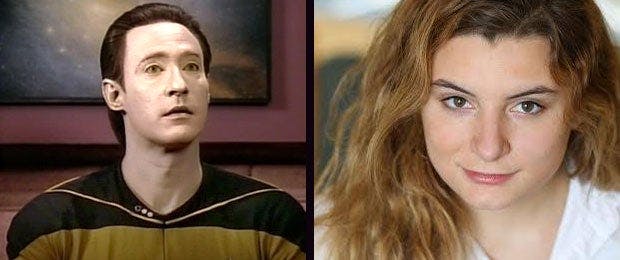
All my life, I’ve had trouble relating to people. Social skills never came easily to me (and still don’t). As one could probably guess, this was frustrating, and left me many times in a state of helplessness - or worse yet, hopelessness. By my doctors, teachers, coaches and especially my peers, my differences were always perceived as something negative, something to be ashamed of, an ailment I needed to overcome before I could start my “real” life. For a while, they had me convinced. I was mad at myself and the world, and in my moments of despair, I was left wondering what I should, or even could, do.
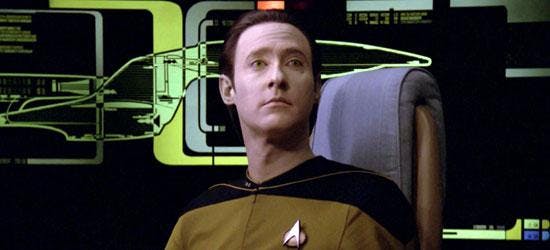
Turns out, it was not a matter of what to do, but who could help. Despite all my efforts to fit in, I found myself drawn to Star Trek, which set me apart even more. I never imagined it would end up giving me the encouragement I needed to change my life. Star Trek is inspirational for many reasons: a utopian future, the advancement of science. But in my case, it was a single character who really moved me - everyone’s favorite android, Data.
At first, I saw him as just another alien life-form that I would watch, but never really identify with. That was until I began to realize how much we had in common. The trials Data went through on the show mirrored experiences in my own life. There were a few similarities that particularly struck me...
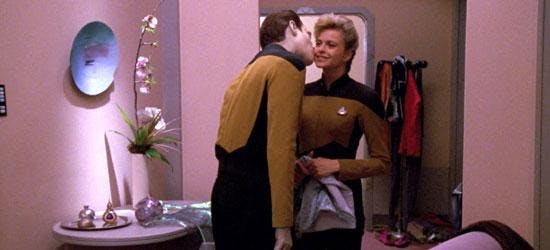
For one, how we both default to what we think we're supposed to do, when we don't quite know what is appropriate to do. I'm recalling the episode “In Theory,” when Data walks into Lt. D'Sora's quarters and announces himself with “Honey, I'm home!” Since neither of us came programmed with social intuition, we have no choice but to rely on patterns we pick up – even if that means reverting to tropes. We use what information is available to us (accessing our internal data banks) to determine our options. Data requires advice, perhaps from Guinan or Counselor Troi, just like I do, to alter my metaphorical “data bank” and make it more accurate with input from my friends. Our methods are not fail-safe, but it is what we both do to get by. And so far, we have.
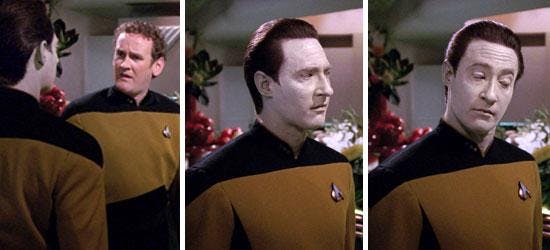
But nobody is perfect, not even an android. In our situations, we suffer more social blunders than most. What can be done when we, in our ineptitude, inconvenience others? Our ways of thinking are unusual, because the inner “algorithms” don’t take into account how situational and nuanced human behavior is. I can picture Data, in the episode “Data’s Day,” going up to Chief O’Brien and delivering the good news that Keiko has called the wedding off. Miles wants her to be happy, and if this will make her happy, what’s the problem? As well as this ineffective, straightforward logic, we both lack a sense of mood. When Picard calls Data in to “rescue” him from being alone with Lwaxana, he goes on and on discussing several mundane topics. He couldn’t tell that Lwaxana found it tedious, or that he was there to serve a very specific purpose. In another scene, Data enters a Turbolift with Riker and Counselor Troi, who immediately stop their conversation. This causes him to wonder out loud - what is wrong? Intrinsically, we’re both aware that something isn’t right, but we don't know what. We both had to quit certain habits, like correcting people or staring at them, because it made people uncomfortable. And we had to adapt, like when learning to small talk, or how to appeal to others’ pathos, as Data did in the episode “The Ensigns of Command” when he had to find a way to convince the settlers to leave their home.
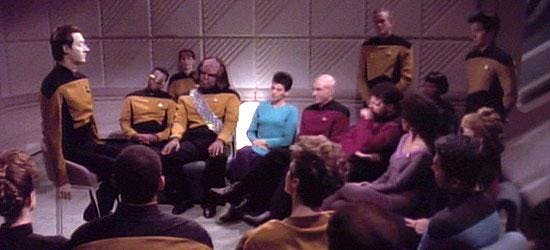
There was one minor instance that resonated with me on a deep level. Right before Data recited his famous Ode to Spot in the episode “Schisms,” he concluded a different poem. He reads:
“... Then we sat on the sand for some time and observed
How the oceans that cover the world were perturbed
By the tides from the orbiting moon overhead
'How relaxing the sound of the waves is,' you said.
I began to expound upon tidal effects
When you asked me to stop, looking somewhat perplexed.
So I did not explain why the sunset turns red
And we watched the occurrence, in silence, instead.”

In the end, it was our one discrepancy that made the most difference: how we each handled our lack of human knowledge. We both strived to better ourselves, but Data viewed it as a journey, not as a deficiency to be ironed out of his system. He gave me hope, which, in turn, gave me the power to change myself. With Data as my guide, I adopted an attitude of discovery and self-improvement. It's certainly worked for me; I can honestly say I feel more comfortable in the world now. Data once said: “If being human is… a way of thinking, acting and feeling, then I am hopeful that one day I will discover my own humanity. Until then... I will continue learning, changing, growing, and trying to become more than what I am.”

